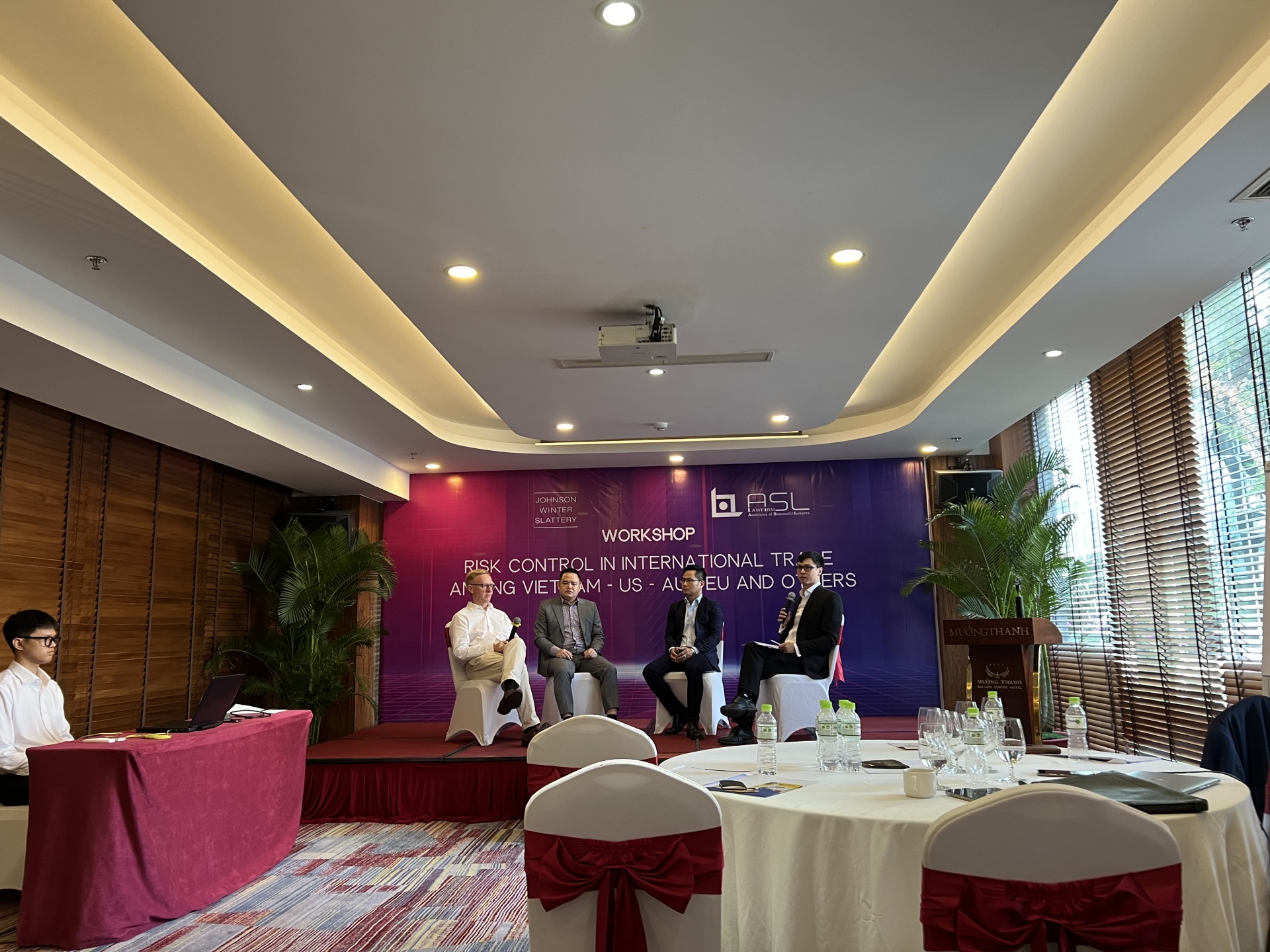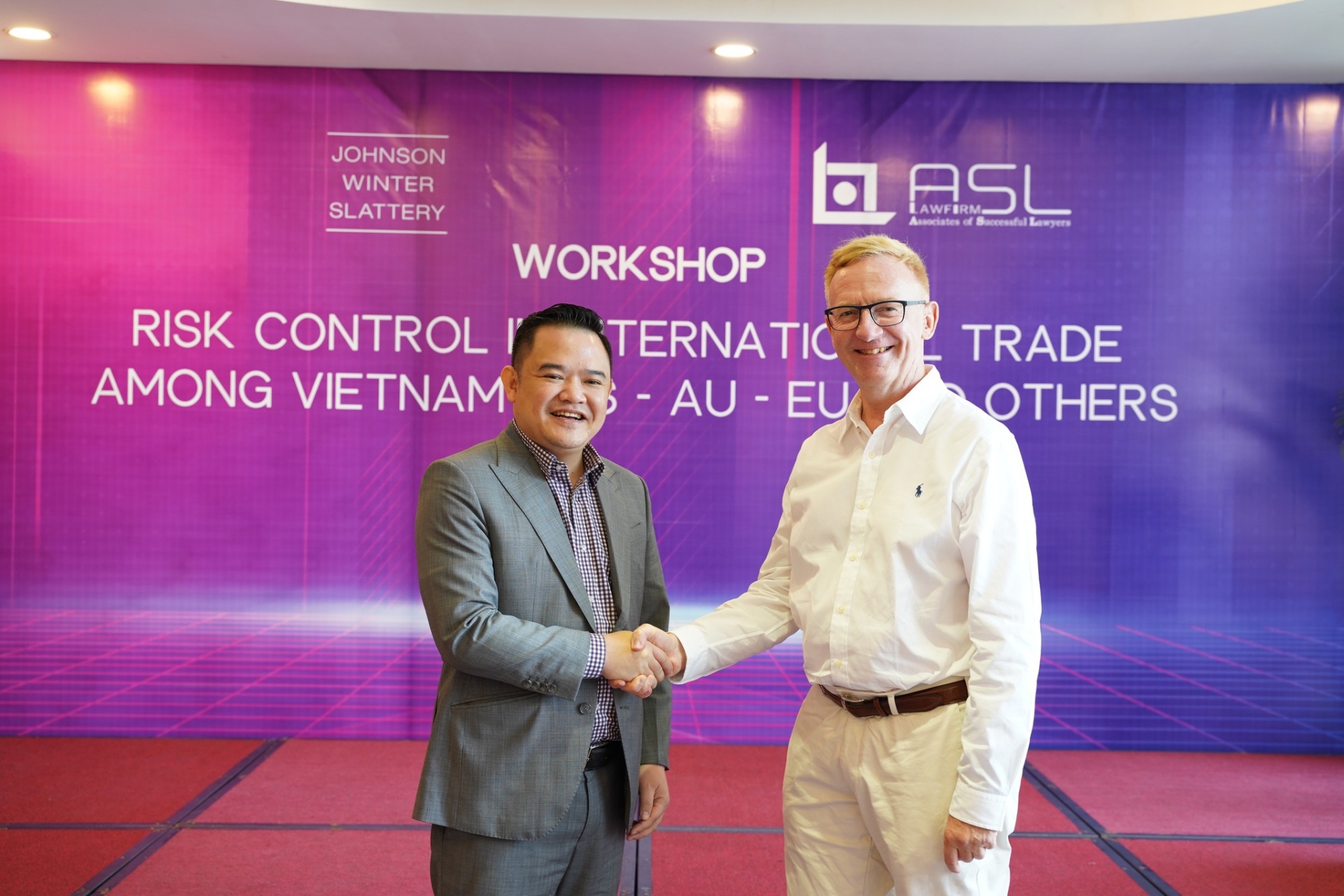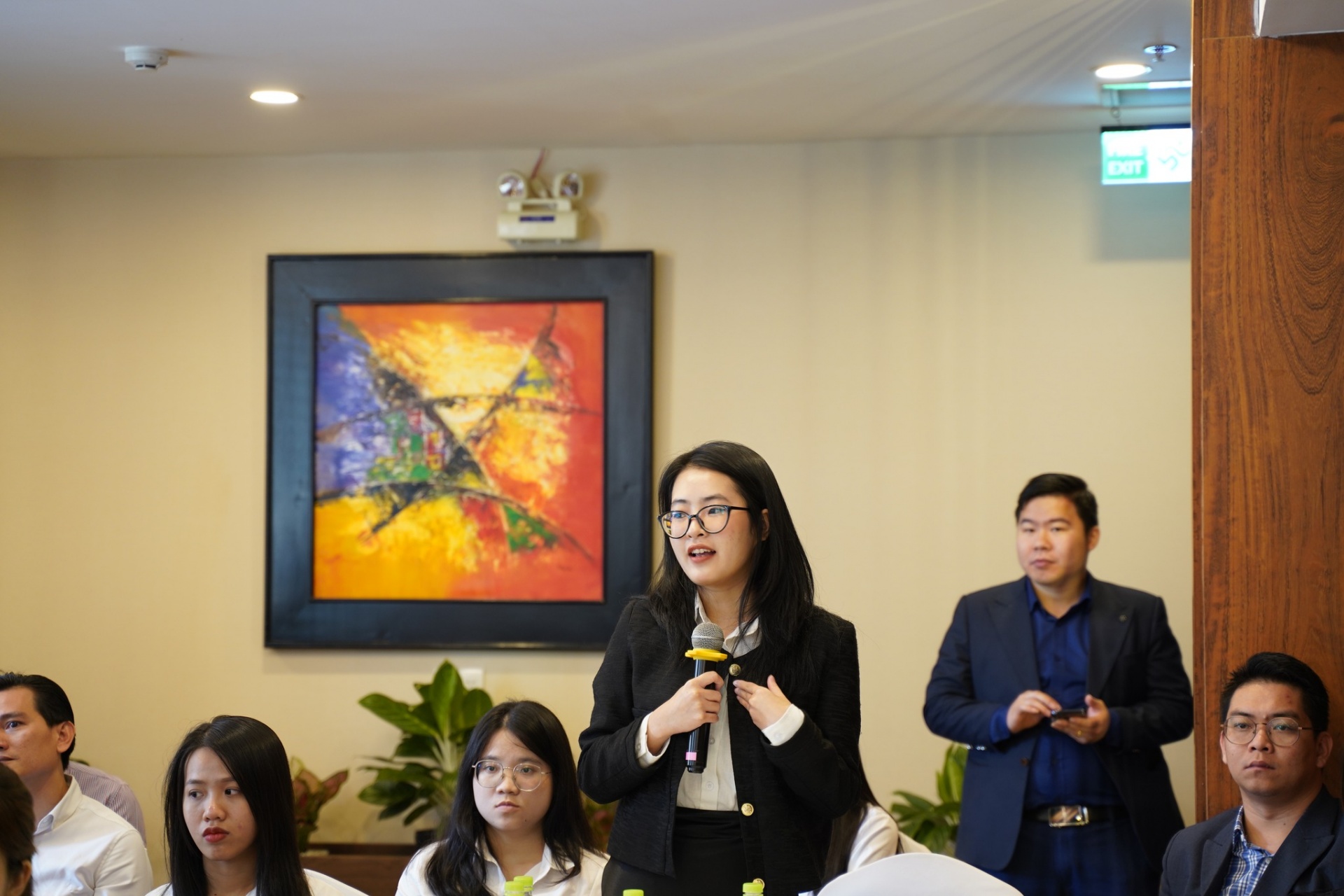ASL Law and Johnson Winter Slattery provide legal advice to control risk
 |
| Experts discussed various topics related to the risks of international trade |
The event was attended by around 80 investment professionals, businesspeople, and top-tier lawyers from companies such as ASL Law, UOB, MSB, and other international firms in Malaysia and Australia.
Robert Wyld, a dispute resolution lawyer specialising in competition, international trade, and anti-corruption law at Johnson Winter Slattery emphasised that as an Australian lawyer, Vietnam is an attractive and fast-growing economy.
“Vietnamese people are very friendly and engaging. This country is an interesting place to come to work and a wonderful place to visit. However, amidst the global economic turmoil, higher trade policy uncertainty could have a significant impact on Vietnamese enterprises,” he said.
“I'd like to have a discussion today about the nature of sanctions, and how they have become such a prominent political topic. Vietnam is one country which does not have sanctions, particularly against Russia. But some groups of countries do, like the EU and big countries like the US, and they can impact on the way you do business down here in Vietnam,” he added. “Thus, there are now increasing legal issues that you have to think about. And sometimes, as a small Australian or Vietnamese company, you don't think it's relevant. However, as soon as you start going out into the big, wide, interesting world, that's when these laws can impact you.”
 |
| Pham Duy Khuong, managing director of ASL Law, and Robert Wyld of Johnson Winter Slattery |
According to the Trade Remedies Authority of Vietnam under the Ministry of Industry and Trade, as of late December, Vietnam recorded 224 cases subject to the trade remedies of other countries in the year to October.
For the trade remedy cases, 26 were reported from 2005 to 2010 and 52 from 2011 to 2015. The 2016-2021 period saw a hike in the number to 109 cases. In November this year alone, there were 16.
The US currently ranks first in applying trade remedies on Vietnam’s exports with 43 cases, followed by ASEAN with 42, India with 29, and the EU with 14.
Pham Duy Khuong, managing director of ASL Law, noted that sanctions have become one of the most popular instruments for governments to address foreign policy issues, and they may include various limitations, from arms and military embargoes to trade restrictions, finance and economic support, luxury goods, travel bans, and asset freezing.
Khuong also pointed out some significant impacts of sanction issues for businesses involved in cross-border trade activities. Global financial institutions are experiencing huge challenges due to the flood of sanctions, export controls, and prohibitions against providing certain financial and corporate services to Russia that have been imposed by Western governments from the US or the EU.
Wyld agreed, adding, “From the banking perspective, what I've seen from international banks, and all of their subsidiaries in Singapore, Hong Kong, Australia, and Europe, is that they are paranoid about sanctions. They are concerned about such strict sanctions and embargoes because they are all easy targets. All the big international banks and their subsidiaries around the world are effectively subject to US, UK, and EU sanctions. Many banks now are requiring their customers to sign off on detailed warranties and representations that they have a sanctions policy in place, and they are not engaging in breaches. That's the big challenge for banks. Therefore, they're adopting a zero-risk approach.”
“In case of such risks, customers may try the Bank of Cyprus, or any local bank in a country where there are no sanctions. But if that bank is connected to the interbank or SWIFT payment system and allows money to travel around the world, there are still some lingering risks,” added Wyld.
 |
Lawyers at the workshop also discussed the trends of dispute settlement around the world, with Wyld believing that business people dislike litigation.
“They do not like litigation in courts in countries where they don't know the system. So, I think the short answer is that all businesses who trade internationally want an arbitration clause. They want to be able to say if they have a dispute, they go into a recognised venue, which is generally Kuala Lumper, Singapore, or Hong Kong. I was in Singapore two weeks ago, and the Chief Justice of Singapore Suresh Menon, who's a very well-respected judge, has established the International Commercial Court, which is effectively a division of the Singapore courts that deals with any legal issue that arises from an arbitration. If you want an arbitration, then you can select your arbitrators. They're professional lawyers, academics, and retired judges. However, arbitration is frankly not that much cheaper than litigation,” he said.
 | Land law considerations for foreigners With the implementation of the Law on Land, many foreign businesses have encountered multiple challenges related to real estate while investing in Vietnam, Pham Duy Khuong, managing director of ASL Law, explains why the country must remove these issues as soon as possible to keep Vietnam attractive. |
 | Effects of new policies on foreign-invested groups Foreign-invested enterprises are making a comeback and on the way to recovery after the extremely difficult last few years. |
 | Land law considerations for non-nationals With the current Law on Land, many foreign businesses have encountered multiple challenges related to real estate while investing in Vietnam. Pham Duy Khuong, managing director of ASL Law, explains why the country must remove these issues as soon as possible in order to keep Vietnam attractive. |
What the stars mean:
★ Poor ★ ★ Promising ★★★ Good ★★★★ Very good ★★★★★ Exceptional
 Tag:
Tag:
Related Contents
Latest News
More News
- Leaders must rediscover discipline of engagement (January 22, 2026 | 11:08)
- IP alterations shape asset strategies for local investors (January 22, 2026 | 10:00)
- 14th National Party Congress: Vietnam - positive factor for peace, sustainable development (January 22, 2026 | 09:46)
- Japanese legislator confident in CPV's role in advancing Vietnam’s growth (January 22, 2026 | 09:30)
- 14th National Party Congress: France-based scholar singles out institutional reform as key breakthrough (January 21, 2026 | 09:59)
- 14th National Party Congress: Promoting OV's role in driving sustainable development (January 20, 2026 | 09:31)
- 14th National Party Congress affirms Party’s leadership role, Vietnam’s right to self-determined development (January 20, 2026 | 09:27)
- Direction ahead for low-carbon development finance in Vietnam (January 14, 2026 | 09:58)
- Vietnam opens arms wide to talent with high-tech nous (December 23, 2025 | 09:00)
- Why global standards matter in digital world (December 18, 2025 | 15:42)



















 Mobile Version
Mobile Version